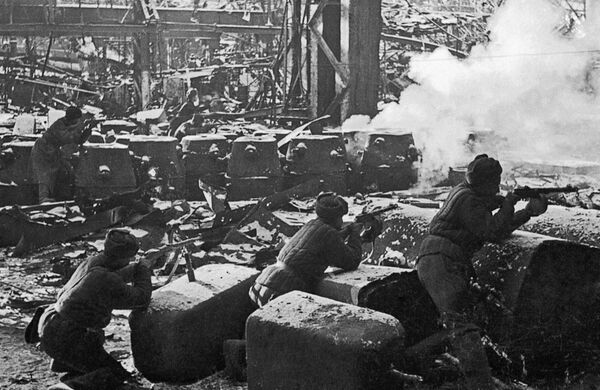MOSCOW. (RIA Novosti military commentator Ilya Kramnik) - The Day of Memory and Grief, June 22, will always be the darkest date in Russia's history, a symbol of absolute tragedy better only than defeat and subsequent capitulation and disappearance of a country from the world's map.
However, this date has generated several heated debates, which have grown since the dissolution of the Soviet Union when some former Soviet republics and East European countries started reviewing the history of World War Two, and especially the role of the Soviet Union in it.
The most widespread beliefs of these revisionists regarding the day when the Soviet Union joined the war can be divided into two groups.
Some say June 22 was the beginning of a new stage in the war, which the Soviet Union joined in September 1939 when Western Ukraine and Western Belarus were annexed into the country.
Others claim that Germany did not attack the Soviet Union without a declaration of war on June 22, but delivered a pre-emptive strike at the Soviet troops poised for occupying Europe.
These falsifications of history were also promoted by the tactic used until 1991, when the Soviet government preferred to keep silent over "embarrassing" facts in Soviet history. The lack of available and reliable research, which would carefully study all of the reasons behind the Soviet Union's failure at the initial stages of the war and openly admit the government's mistakes and shortcomings, has made one wonder if the government was deliberately hiding and distorting facts.
So, what really happened on June 22, 1941?
The German attack was not a strategic surprise, because the Soviet government knew about Operation Barbarossa and the accumulation of German troops on the Soviet border. It knew that a war was imminent and worked frantically to prepare for it.
However, the German transport system was superior to that of the Soviet Union. Germany could send 50%-100% more trains with troops and weapons from the West to the eastern border than the Soviet government could send from the eastern parts of its country.
Another debated question is the balance of German and Soviet troops in the border battles of 1941. Many people compare the "gross" strength of their armies, forgetting that far from all units and divisions of either country were dispatched to the battlefront.
In fact, Germany and its allies had three groups of armies with 5.5 million troops, 4,171 tanks and self-propelled guns, 47,260 medium and heavy artillery guns and mortars, and 4,950 combat aircraft.
The Soviet Union had 3.3 million troops in the western military districts (including 2.9 million in the regular army), over 10,000 tanks, 32,900 medium and heavy artillery guns and mortars, and some 11,000 combat planes.
While the Soviet army had fewer troops, it seemed to have more tanks and aircraft. However, barely 70% of tanks and aircraft were in working order, due to problems in the Soviet defense industry.
It is impossible to establish the exact persons guilty of the Soviet Union's defeat at the initial stages of the war. Both the generals and the political leadership are to blame - the generals for choosing an unwise deployment plan in the western districts, and the politicians for choosing the wrong development model for the army, which unbalanced military groups and led to their quick disintegration in wartime conditions.
Another indisputable fact is that the German army was stronger that the Soviet army at that time. It had skilled and disciplined troops, reliable and high-quality military equipment, and staff officers with combat experience.
With such an army, Germany expected to attain much more in the initial battles with the Soviet Union. It is thanks to the selfless struggle of our grandfathers that it failed to attain its goals.
Waging life-or-death battles and losing a substantial part of its territory, the Soviet Army stopped the advancing German troops and prevented them from attaining the goals outlined in the blitzkrieg plans.
Moreover, Germany, even though it used the resources and capabilities of axis states, could not win the war of economic and human resources against the Soviet Union, let alone the subsequent anti-Hitler coalition.
The opinions expressed in this article are the author's and do not necessarily represent those of RIA Novosti.



